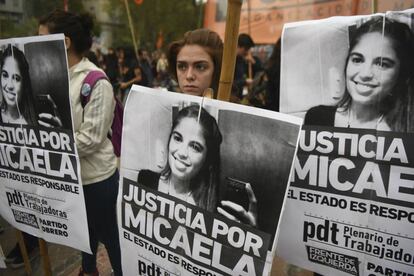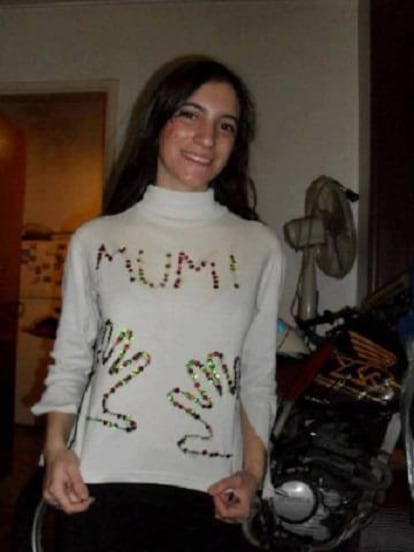Argentina to create a DNA registry of convicted sex offenders
Recent murder prods government into action; existing law had been languishing since 2013

Lucila Yaconis was 16 years old when she was suffocated to death after resisting rape in an underpass at a Buenos Aires station in 2003. The police found genetic material belonging to the assailant, but were unable to identify him. The crime remains unpunished to this day.

The victim’s mother, Isabel Yaconis, believes that things would have been different if Argentina had had a DNA registry such as the one that President Mauricio Macri is now rushing to set up.
By doing so, Argentina will be following in the footsteps of Britain, France, the United States and Spain, which already have sex offender registries.
The national congress passed the Sex Offender Registration Law in 2013, amid a general commotion over the killing of Ángeles Rawson, another 16-year-old girl who was found dead in a Buenos Aires dump. But the law was never implemented.
This measure will not benefit us. It will not put an end to sexual violence or an end to rapes
Sabrina Cartabia, lawyer
Now, following a new case of sexual abuse and murder – the victim this time is 21-year-old Micaela García, whose alleged attacker was a convicted rapist out on parole – the government has announced that the registry is finally going to become a reality.
The register will include genetic material from sex offenders whose convictions are final, and will be accessible to government employees working on judicial cases.
A meeting is scheduled for Thursday with all the forensic labs that work with prosecutors, to decide how best to extract and conserve the DNA samples. A committee made up of members of three ministries will provide oversight.

The registry will become a reality in the coming weeks, said sources at the Justice Ministry.
“The association Madres del dolor has been fighting for years to make the genetic database a reality, but we Argentineans act like firefighters. The law was voted in when Ángeles’ body turned up, and now this is happening when Micaela’s body has emerged,” says Yaconis.
“I have the DNA of the person who killed my daughter, but he is a NN (No Name, or John Doe). And he is not the only one, there are many others like him,” adds Lucila’s mother, who hopes that the implementation of the law will help solve open cases. “This is not going to end rape, but we are going to start backing rapists into a corner.”
Mendoza province, in western Argentina, pioneered the passing of legislation to create a registry of rapists, but there was not enough political will to make it a reality, says Luis Petri, the deputy who drafted the bill. This lawmaker celebrates the upcoming creation of a national registry.
“It is instrumental in the prevention of impunity,” he says. “It helps solve cases, especially rape cases, because sexual offenders very often leave behind genetic traces such as skin, blood or semen.”
I have the DNA of the person who killed my daughter, but he is a John Doe
Isabel Yaconis, mother of victim
Petri also believes that the law will help prevent recidivism.
According to Justice Ministry data, sex crime convictions grew 33% from 2012 to 2015, the last year for which figures are available. But an association called Ni Una Menos believes that these figures are just the tip of the iceberg, and that it will be the same story with the registry.

“We women undergo many forms of sexual violence, and very few of them lead to an effective conviction,” warns Sabrina Cartabia, a lawyer and member of Ni Una Menos. Cartabia claims that the registry “will identify a very small number of sexual offenders” and will not take into account the fact that a majority of women “do not report assault, and those who do are not believed.”
“This measure will not benefit us. It will not put an end to sexual violence or an end to rapes,” she says.
Ni Una Menos believes that prevention is more effective than punishment. “There is a tool already in existence, which is comprehensive sex education. It confers knowledge and respect, which is what is needed, because if you are able to identify what constitutes abuse, you can react in time, stop it or ask for help. But this is not happening because the government has hobbled the program,” says Cartabia.
English version by Susana Urra.
Tu suscripción se está usando en otro dispositivo
¿Quieres añadir otro usuario a tu suscripción?
Si continúas leyendo en este dispositivo, no se podrá leer en el otro.
FlechaTu suscripción se está usando en otro dispositivo y solo puedes acceder a EL PAÍS desde un dispositivo a la vez.
Si quieres compartir tu cuenta, cambia tu suscripción a la modalidad Premium, así podrás añadir otro usuario. Cada uno accederá con su propia cuenta de email, lo que os permitirá personalizar vuestra experiencia en EL PAÍS.
¿Tienes una suscripción de empresa? Accede aquí para contratar más cuentas.
En el caso de no saber quién está usando tu cuenta, te recomendamos cambiar tu contraseña aquí.
Si decides continuar compartiendo tu cuenta, este mensaje se mostrará en tu dispositivo y en el de la otra persona que está usando tu cuenta de forma indefinida, afectando a tu experiencia de lectura. Puedes consultar aquí los términos y condiciones de la suscripción digital.








































